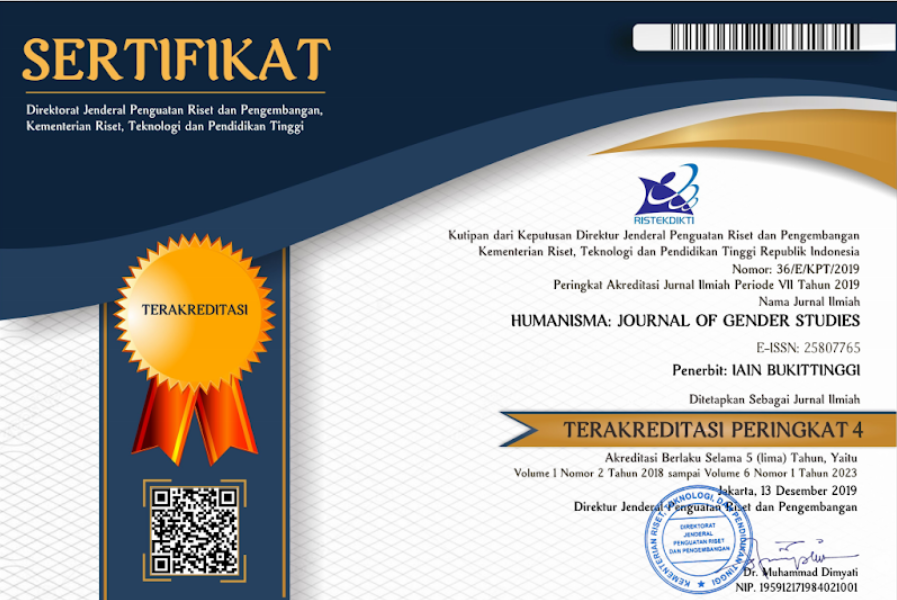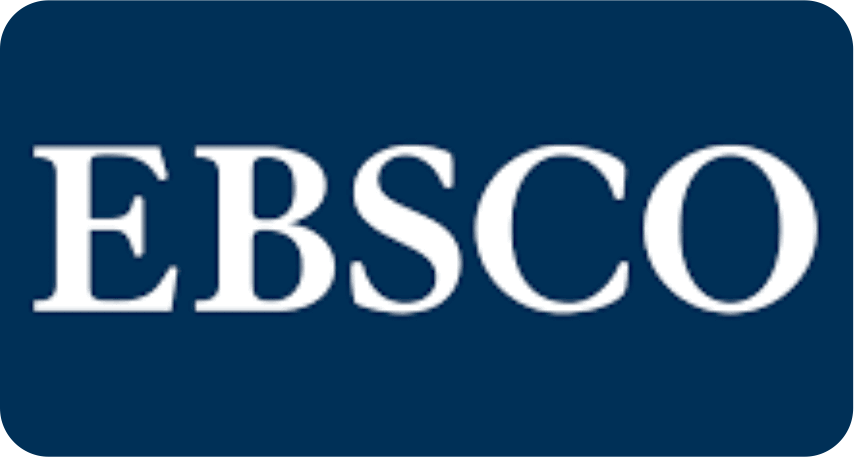Quraish Shihab's Interpretation of Gender Equality In Tafsir Al-Misbah
DOI:
https://doi.org/10.30983/humanisme.v6i1.5406Keywords:
Equality in creation, Equality Inprophethood, Gender Equality, Tafsir Al-Misbah, Feminism Theory,Abstract
This study explores Quraish Shihab's interpretation of gender equality issues, such as equality in creation, marriage, prophethood, the role of women in the public world, and others. This research uses the library research method, and the first and primary source is Tafsir al-Misbah. Operationally, the researchers readvarious literature written by scholars, both East and West, on the concept of gender from the perspective of feminism. Then, the researchers read the Tafsir al-Misbah on the same theme. Does feminist thought influence Quraish Shihab's interpretation or not? This research finds that according to Quraish Shihab, the issue of gender equality in the Qur'an must be understood proportionally, unlike gender practitioners who interpret the Qur'an excessively and seem to impose their will. Quraish Shihab argues that men and women are naturally different both physically and psychologically. Both also have equality in terms of humanity and rights. Women have advantages that men do not have and vice versa. Both need each other.
Kajian ini mengeksplorasi interpretasi Quraish Shihab terhadap isu-isu kesetaraan gender, seperti kesetaraan dalam penciptaan, perkawinan, kenabian, peran perempuan di dunia publik, dan lain-lain. Penelitian ini menggunakan metode penelitian kepustakaan, dan sumber pertama dan utama adalah Tafsir al-Misbah. Secara operasional, peneliti membaca berbagai literatur yang ditulis oleh para sarjana, baik Timur maupun Barat, tentang konsep gender dari perspektif feminisme. Kemudian peneliti membacakan Tafsir al-Misbah dengan tema yang sama. Apakah pemikiran feminis mempengaruhi penafsiran Quraish Shihab atau tidak? Penelitian ini menemukan bahwa menurut Quraish Shihab, persoalan kesetaraan gender dalam Al-Qur'an harus dipahami secara proporsional, tidak seperti praktisi gender yang menafsirkan Al-Qur'an secara berlebihan dan terkesan memaksakan kehendaknya. Quraish Shihab berpendapat bahwa laki-laki dan perempuan secara alamiah berbeda baik secara fisik maupun psikis. Keduanya juga memiliki kesetaraan dalam hal kemanusiaan dan hak. Wanita memiliki kelebihan yang tidak dimiliki pria dan sebaliknya. Keduanya saling membutuhkan.
References
Journal
Ann Rose Davis. “Marxist Feminism: An Analysis on Class Structure and Position of Women in Malayalam Movie -‘Chemmeen.’†The Creative Launcher 6, no. 1 (2021). https://doi.org/10.53032/tcl.2021.6.1.10.
Bimer, Eyayu Enyew, and Getaneh Mihrete Alemeneh. “Liberal Feminism: Assessing Its Compatibility and Applicability in Ethiopia Context.†International Journal of Sociology and Anthropology 10, no. 6 (2018). https://doi.org/10.5897/ijsa2018.0769.
Brenner, Johanna. “21st Century Socialist-Feminism.†Socialist Studies/Études Socialistes 10, no. 1 (2014). https://doi.org/10.18740/s4rp43.
Dhatt, R., S. Theobald, S. Buzuzi, B. Ros, S. Vong, K. Muraya, S. Molyneux, et al. “The Role of Women’s Leadership and Gender Equity in Leadership and Health System Strengthening.†Global Health, Epidemiology and Genomics 2 (2017). https://doi.org/10.1017/gheg.2016.22.
Fakih, Dr. Mansour. “Posisi Kaum Perempuan Dalam Tradisi Islam.†Tarjih 1, no. Desember (1996).
Gupta, Geeta Rao, Nandini Oomman, Caren Grown, Kathryn Conn, Sarah Hawkes, Yusra Ribhi Shawar, Jeremy Shiffman, et al. “Gender Equality and Gender Norms: Framing the Opportunities for Health.†The Lancet. Lancet Publishing Group, June 22, 2019. https://doi.org/10.1016/S0140-6736(19)30651-8.
Hasibuan, Liliana. “Woman Trafficking Dan Konseling Psikososial Sebagai Penolong.†Al-Irsyad: Jurnal Bimbingan Konseling Islam 3, no. 1 (2021).
Mackay, Finn. “Radical Feminism.†Theory, Culture & Society 32, no. 8 (2015). https://doi.org/10.1177/0263276415616682.
Oakley, Ann. “The Difference between Sex and Gender.†In The Ann Oakley Reader, 2017. https://doi.org/10.2307/j.ctt1t88xpn.7.
Sax, Linda J., and Casandra E. Harper. “Origins of the Gender Gap: Pre-College and College Influences on Differences between Men and Women.†Research in Higher Education 48, no. 6 (September 9, 2007): 669–94. https://doi.org/10.1007/S11162-006-9046-Z/TABLES/7.
Selzer, Robin, Amy Howton, and Felicia Wallace. “Rethinking Women’s Leadership Development: Voices from the Trenches.†Administrative Sciences 7, no. 2 (2017). https://doi.org/10.3390/admsci7020018.
Shihab, M. Quraish. Membumikan Al-Qur’an: Fungsi Dan Peran Wahyu Dalam Al-Qur’an. Bandung: Mizan, 1992.
———. Tafsir Al-Misbah: Pesan, Kesan, Dan Keserasian Al-Qur’an, Vol. VII. Jakarta: Lentera Hati, 2006.
———. Tafsir Al-Misbah: Pesan, Kesan, Dan Keserasian Al-Qur’an, Vol. VIII. Jakarta: Lentera Hati, 2006.
Shihab, Muhammad Quraish. Tafsir Al-Misbah: Pesan, Kesan, Dan Keserasian Al-Qur’an, Vol. VI. Jakarta: Lentera Hati, 2006.
———. “Tafsir Al-Misbah: Pesan, Kesan Dan Keserasian Al-Qur’an, Vol. II.†Jakarta: Lentera Hati, 2006.
———. Wawasan Al-Qur’an: Tafsir Maudhu’i Atas Pelbagai Persoalan Umat. Bandung: Mizan, 1998.
Book
Budiman, Arif. Pembagian Kerja Secara Seksual, Sebuah Pembahasan Sosiologis Tentang Peran Wanita Di Dalam Masyarakat. Jakarta: Gramedia, 1981.
Engineer, Asghar Ali. Hak-Hak Perempuan Dalam Islam. Edited by Farid Wajdi dan Cici Farkha Assegaf. Yogyakarta: Bentang Budaya, 1994.
Fakih, Mansour. Analisis Gender Dan Transformasi Sosial. Yogyakarya: INSISTPress, 2008.
Ihromi, T.O. Kajian Wanita Dalam Pembangunan. Jakarta: Yayasan Obor Indonesia, 1995.
Inglehart, Ronald, Pippa Norris, Christian Welzel, and Wissenschaftszentrum Berlin. “Gender Equality and Democracy,†n.d.
Umar, Narasudin. Argumen Kesetaraan Gender Dalam Perspektif Alqur’an. Paramadina. Jakarta: Paramadina, 1999.
Umar, Nasaruddin. Argumen Kesetaraan Jender Perspektif Al-Qur’an. Jakarta: Paramadina, 1999.
Downloads
Submitted
Accepted
Published
Issue
Section
License
Authors who publish with this journal agree to the following terms:
- Authors retain copyright and grant the journal right of first publication with the work simultaneously licensed under a Creative Commons Attribution-ShareAlike 4.0. that allows others to share the work with an acknowledgment of the work's authorship and initial publication in this journal.
- Authors are able to enter into separate, additional contractual arrangements for the non-exclusive distribution of the journal's published version of the work (e.g., post it to an institutional repository or publish it in a book), with an acknowledgment of its initial publication in this journal.
- Authors are permitted and encouraged to post their work online (e.g., in institutional repositories or on their website) prior to and during the submission process, as it can lead to productive exchanges, as well as earlier and greater citation of published work (See The Effect of Open Access).



















